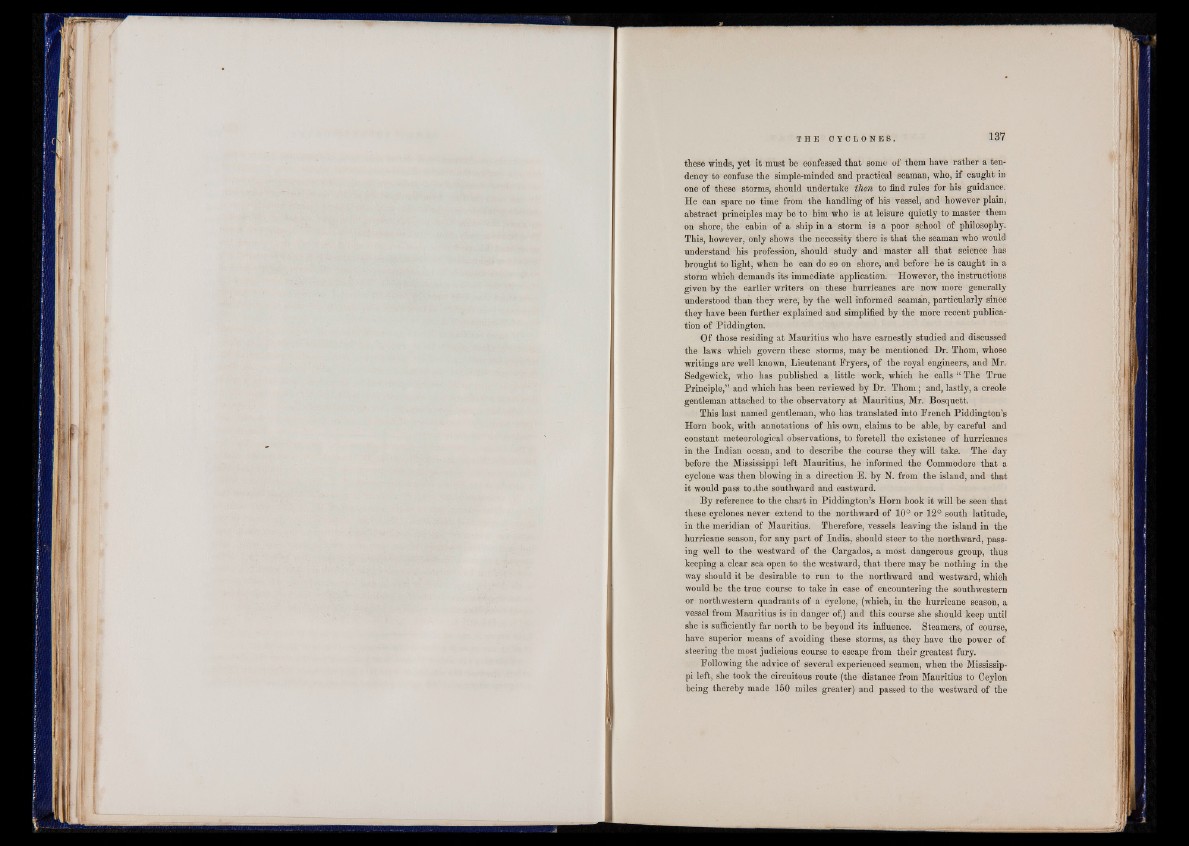
T H E C Y C L O K E S . 137
these winds, yet it must he confessed that some of them have rather a tendency
to confuse the simple-minded and practical seaman, who, if caught in
one of these storms, should undertake then to find ruleB for his guidance.
He can spare no time from the handling of his vessel, and however plain,
abstract principles may he to him who is at leisure quietly to master them
on shore, the cabin of a ship in a storm is a poor school of philosophy.
This, however, only shows the necessity there is that the seaman who would
understand his profession, should study and master all that science has
brought to light, when he can do so on shore, and before he is caught in a
storm which demands its immediate application. However, the instructions
given by the earlier writers on these hurricanes are now more generally
understood than they were, by the well informed seaman, particularly since
they have been further explained and simplified by the more recent publication
of Piddington.
Of those residing at Mauritius who have earnestly studied and discussed
the laws which govern these storms, may be mentioned Dr. Thom, whose
writings are well known, Lieutenant Fryers, of the royal engineers, and Mr.
Sedgewick, who has published a little work, which he calls “ The True
Principle,” and which has been reviewed by Dr. Thom; and, lastly, a creole
gentleman attached to the observatory at Mauritius, Mr. Bosquett.
This last named gentleman, who has translated into French Piddington’s
Horn book, with annotations of his own, claims to he able, by careful and
constant meteorological observations, to foretell the existence of hurricanes
in the Indian ocean, and to describe the course they will take. The day
before the Mississippi left Mauritius, he informed the Commodore that a
cyclone was then blowing in a direction E. by N. from the island, and that
it would pass to .the southward and eastward.
By reference to the chart in Piddington’s Horn book it will be seen that
these cyclones never extend to the northward of 10° or 12° south latitude,
in the meridian of Mauritius. Therefore, vessels leaving the island in the
hurricane season, for any part of India, should steer to the northward, passing
well to the westward of the Cargados, a most dangerous group, thus
keeping a clear sea open to the westward, that there may be nothing in the
way should it be desirable to run to the northward and westward, which
would be the true course to take in case of encountering the southwestern
or northwestern quadrants of a cyclone, (which, in the hurricane season, a
vessel from Mauritius is in danger of,) and this course she should keep until
she is sufficiently far north to be beyond its influence. Steamers, of course,
have superior means of avoiding these storms, as they have the power of
steering the most judicious course to escape from their greatest fury.
Following the advice of several experienced seamen, when the Mississippi
left, she took the circuitous route (the distance from Mauritius to Ceylon
being thereby made 150 miles greater) and passed to the westward of the